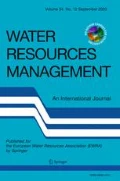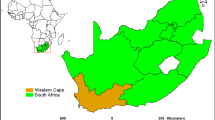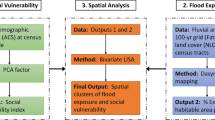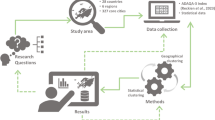Abstract
European urban agglomerations face increasing flood risks due to urbanization and the effects of climate change. These risks are addressed at European, national and regional policy levels. A diversification and alignment of Flood Risk Management Strategies (FRMSs) can make vulnerable urban agglomerations more resilient to flooding, but this may require new Flood Risk Governance Arrangements (FRGAs) or changes in existing ones. While much technical knowledge on Flood Risk Management is available, scientific insights into the actual and/or necessary FRGAs so far are rather limited and fragmented. This article addresses this knowledge gap by presenting a research approach for assessing FRGAs. This approach allows for the integration of insights from policy scientists and legal scholars into one coherent framework that can be used to identify Flood Risk Management Strategies and analyse Flood Risk Governance Arrangements. In addition, approaches for explaining and evaluating (shifts in) FRGAs are introduced. The research approach is illustrated by referring to the rise of the Dutch risk-based approach called ‘multi-layered safety’ and more specifically its application in the city of Dordrecht. The article is concluded with an overview of potential next steps, including comparative analyses of FRGAs in different regions. Insights in these FRGAS are crucial to enable the identification of action perspectives for flood risk governance for actors at the level of the EU, its member states, regional authorities, and public-private partnerships.

Similar content being viewed by others
Notes
Between 2000 and 2005, Europe suffered more than 100 floods, including nine major flood disasters. Besides economic losses of more than € 35 billion, these floods also caused 155 casualties. Events causing a high number of fatalities were the floods in Romania in 2005 (85 fatalities) and the 1998 disaster in Slovakia (54 fatalities). Large economic losses were caused by floods in the Elbe basin in 2002 (over EUR 20 billion), in Italy, France and the Swiss Alps in 2000 (around EUR 12 billion), and a series of those in the United Kingdom during the summer of 2007 (accumulated losses exceed EUR 4 billion) (Barredo 2007). Also the 2013 floods in central Europe (14 casualties and significant economic damage) and recent flood experiences in the UK demonstrate the actual threat of floods in Europe.
In The Netherlands, primary flood defences have a legally prescribed safety norm expressed in terms of the probability of overtopping, that is the chance that the flood level becomes higher than a certain specified height. The maximum allowed probability of overtopping is currently specified per dike protected area. Throughout The Netherlands, this probability ranges from 1/250 to 1/10,000 and is intended to be lowest in places where the potential consequences of floods are highest (e.g. 1/10,000 in Zuid-Holland).
References
Adger N, Brown K, Fairbrass J, Jordan A, Paavola J, Rosendo S, Seyfang G (2003) Governance for sustainability: towards a thick analysis of environmental decision-making. Environ Plan A :1095–1110
Aerts JCJH, Botzen W, Van der Veen A, Krywkow J, Werners S (2008) Dealing with uncertainty in flood management through diversification. Ecol Soc 13(1):41–57
Araral E, Wang Y (2013) Water Governance 2.0: a review and second generation research agenda. Water Resour Manag 27:3945–3957
Arts B, Leroy P, Van Tatenhove J (2006) Political modernisation and policy arrangements: a framework for understanding environmental policy change. Public Organ Rev 6(2):93–106
Barredo JI (2007) Major flood disasters in Europe: 1950–2005. Nat Hazards 42(1):125–148
Brouwer S, Biermann F (2011) Towards adaptive management: examining the strategies of policy entrepreneurs in Dutch water management. Ecol Soc 16(4):5
Capano G, Howlett M (2009) Introduction: the determinants of policy change: advancing the debate. J Comp Pol Anal 11(1):1–5
Davoudi S, Shaw G, Jamila Haider L, Quinlan AE, Peterson GD, Wilkinson C, Fünfgeld H, McEvoy D, Porter L, Davoudi S (2012) Resilience: a bridging concept or a dead End? “reframing” resilience: challenges for planning theory and practice interacting traps: resilience assessment of a pasture management system in northern Afghanistan urban resilience: what does it mean in planning practice? resilience as a useful concept for climate change adaptation? the politics of resilience for planning: a cautionary note. Plan Theory Prac 13(2):299–333
Dieperink C (2000) Successful international cooperation in the Rhine catchment area. Water Int 25(3):347–355
Djordjevic S, Butler D, Gourbesville P, Ole M, Pasche E (2011) New Policies to deal with climate change and other drivers impacting on resilience to flooding in urban areas: the CORFU approach. Environ Sci Pol 14:864–873
Downs A (1972) Up and down with ecology: the issue attention cycle. Public Interes 28:38–50
Driessen PPJ, De Gier A (1999) Flooding, river management and emergency legislation—experiences of the accelerated reinforcement of dikes in the Netherlands. J Econ Soc Geogr 90(3):336–342
Folke C (2006) Resilience: the emergence of a perspective for social-ecological systems analyses. Glob Environ Chang 16(3):253–267
Gersonius B, Hulsebosch M, Kelder E (2012) Concept gebiedsrapportage eiland van Dordrecht. Deltaprogramma Rijnmond Drechtsteden, Dordrecht
Giddens A (1984) The constitution of society. Polity Press, Cambridge
Green C, Viavattene C, Thompson P (2011) Guidance for assessing flood losses, CONHAZ report, CONHAZ report. Flood hazard research centre. Middlesex University, London
Guha-Sapir D, Hoyois P, Below R (2013) Annual disaster statistical review 2012: The numbers and trends. CRED, Brussels
Hartmann T, Driessen PPJ (2014) The flood risk management plan: towards spatial water governance. J Flood Risk Manag. doi:10.1111/jfr3.12077
Hegger DLT, Green C, Driessen PPJ, Bakker M, Dieperink C, Crabbé A, Deketelaere K, Delvaux B, Suykens C, Beyers JC, Fournier M, Larrue C, Manson C, Van Doorn-Hoekveld W, Van Rijswick M, Kundzewicz ZW, Goytia Casermeiro S (2013) Flood risk management in Europe: Similarities and differences between the STAR-FLOOD consortium countries. STAR-FLOOD Consortium, Utrecht
Hoss F (2010) A comprehensive assessment of Multilayered safety (Meerlaagsveiligheid) in flood risk management. Master thesis, Delft University of Technology
Hughes TP (1987) The evolution of large technological systems. In: Bijker WE, Hughes TP, Pinch T (eds) The social construction of technological systems: new directions in the sociology and history of technology. MIT Press, Cambridge, pp 51–82
Huitema D, Meijerink S (2010) Realizing water transitions: the role of policy entrepreneurs in water policy change. Ecol Soc 15(2):26
IPCC (2011) Summary for policymakers of intergovernmental panel on climate change special report on managing the risks of extreme events and disasters to advance climate change adaptation. Cambridge University Press, Cambridge
Keessen AM, Van Rijswick HFMW (2012) Adaptation to climate change in European water Law and policy. Utrecht Law Rev 8(3):38–50
Keessen A, Hamer MJM, Van Rijswick HFMW, Wiering M (2013) The concept of resilience from a normative perspective: examples from Dutch adaptation strategies. Ecol Soc 18(2):45
Kellens W, Vanneuville W, Verfaillie E, Meire E, Deckers P, De Maeyer P (2013) Flood risk management in Flanders: past developments and future challenges. Water Resour Manag 27:3585–3606
Kingdon J (1984) Agendas, alternatives, and public policies. Little, Brown, Boston
Klijn F, De Bruijn K, Ölfert A, Penning-Rowsell E, Simm J, Wallis M (2009) Flood risk assessment and flood risk management; an introduction and guidance based on experiences and findings of FLOODsite (an EU-funded integrated project). FLOODsite consortium
Kunreuther H (2008) Reducing losses from catastrophic risks through long-term insurance and mitigation. Soc Res 75(3):905–930
Meijerink S, Dicke W (2008) Shifts in the public-private divide in flood management. Int J Water Res Dev 24(4):499–512
Mitchell JK (2003) European river floods in a changing world. Risk Anal 23(3):567–574
Oosterberg W, Van Drimmelen C, Van der Vlist M (2005) Strategies to harmonize urbanization and flood risk management in deltas. In: 45th Congress of the European Regional Science Association, Vrije Universiteit Amsterdam pp. 23–27
Ostrom E (1990) Governing the commons: The evolution of institutions for collective action. Cambridge University Press, New York
Paavola J (2008) Science and social justice in the governance of adaptation to climate change. Environ Polit 17(4):644–659
Pahl-Wostl C (2009) A conceptual framework for analysing adaptive capacity and multi-level learning processes in resource governance regimes. Glob Environ Chang 19(3):354–365
Programmateam Rijnmond-Drechtsteden (2012) Deltaprogramma 2013: Probleemanalyse Rijnmond Drechtsteden. Deltaprogramma Rijnmond-Drechtsteden
Quevauviller P (2011) Adapting to climate change: reducing water-related risks in Europe—EU policy and research considerations. Environ Sci Pol 14:722–729
Raadgever GT, Mostert E, Van de Giesen NC (2012) Learning from collaborative research in water management practice. Water Resour Manag 26:3251–3266
Sabatier P, Weible CM (2007) The advocacy coalition framework: Innovations and clarifications. In: Sabatier PA (ed) Theories of the policy process. Westview Press, Davis, pp 189–220
Steinfűhrer A, Kuhlicke C, De Marchi B, Scolobig A, Tapsell S and Tunstall S (2009) Local communities at risk from flooding. Social vulnerability, resilience and recommendations for flood risk management in Europe. Final report for FLOODsite, Winterwork, Grimma
Van Buuren A, Driessen PPJ, Teisman G, Van Rijswick M (2013) Toward legitimate governance strategies for climate adaptation in The Netherlands: combining insights from a legal, a planning and a network perspective. Reg Environ Change doi: http://dx.doi.org/10.1007/s10113-013-0448-0
Van den Brink M, Termeer C, Meijerink S (2011) Are Dutch water safety institutions prepared for climate change? J Water Clim Chang 2(4):272–287
Van Rijswick M, Havekes H (2012) European and Dutch water law. Europa Law Publishing, Groningen
Van Tatenhove J, Arts, Leroy P (2000) Political modernisation and the environment: the renewal of environmental policy arrangements. Kluwer Academic Publishers, Dordrecht
Wardekker JA, De Jong A, Knoop JM, Van der Sluijs JP (2010) Operationalising a resilience approach to adapting an urban delta to uncertain climate changes. Technol Forecast Soc 77(6):987–998
Wiering, MA (2008) Shock waves and institutional change, chains of events and events of change, the role of shock events in policy change. Freude am Fluss conference. Radboud University Nijmegen
Wiering M, Arts B (2006) Discursive shifts in Dutch water management: ‘Deep’ institutional change or adaptation strategy? Hydrobiol 565(1):327–338
Acknowledgments
This paper has been written in the framework of the European Union’s Seventh Programme for Research, Technological Development and Demonstration within the STAR-FLOOD project. This research has received funding from the European Commission under grant agreement no. 308364. We would also like to thank the participants of the STAR-FLOOD consortium workshop in Amsterdam on 12 February 2013 which contributed to a refinement of the approach presented in this paper, Ellen Kelder and Berry Gersonius for their detailed insights on flood risk governance in Dordrecht, Ton Markus for producing the figure illustrating Dordrecht’s vulnerability to flooding as well as Tina New stead for her language corrections.
Author information
Authors and Affiliations
Corresponding author
Rights and permissions
About this article
Cite this article
Hegger, D.L.T., Driessen, P.P.J., Dieperink, C. et al. Assessing Stability and Dynamics in Flood Risk Governance. Water Resour Manage 28, 4127–4142 (2014). https://doi.org/10.1007/s11269-014-0732-x
Received:
Accepted:
Published:
Issue Date:
DOI: https://doi.org/10.1007/s11269-014-0732-x




